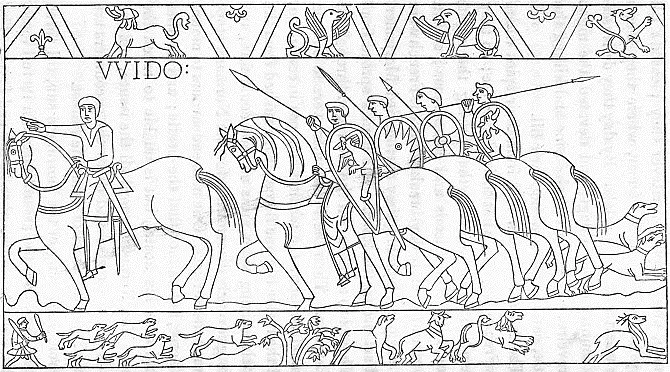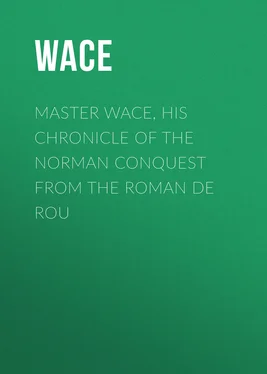Wace - Master Wace, His Chronicle of the Norman Conquest From the Roman De Rou
Здесь есть возможность читать онлайн «Wace - Master Wace, His Chronicle of the Norman Conquest From the Roman De Rou» — ознакомительный отрывок электронной книги совершенно бесплатно, а после прочтения отрывка купить полную версию. В некоторых случаях можно слушать аудио, скачать через торрент в формате fb2 и присутствует краткое содержание. Жанр: foreign_prose, История, foreign_edu, foreign_antique, на английском языке. Описание произведения, (предисловие) а так же отзывы посетителей доступны на портале библиотеки ЛибКат.
- Название:Master Wace, His Chronicle of the Norman Conquest From the Roman De Rou
- Автор:
- Жанр:
- Год:неизвестен
- ISBN:нет данных
- Рейтинг книги:4 / 5. Голосов: 1
-
Избранное:Добавить в избранное
- Отзывы:
-
Ваша оценка:
- 80
- 1
- 2
- 3
- 4
- 5
Master Wace, His Chronicle of the Norman Conquest From the Roman De Rou: краткое содержание, описание и аннотация
Предлагаем к чтению аннотацию, описание, краткое содержание или предисловие (зависит от того, что написал сам автор книги «Master Wace, His Chronicle of the Norman Conquest From the Roman De Rou»). Если вы не нашли необходимую информацию о книге — напишите в комментариях, мы постараемся отыскать её.
Master Wace, His Chronicle of the Norman Conquest From the Roman De Rou — читать онлайн ознакомительный отрывок
Ниже представлен текст книги, разбитый по страницам. Система сохранения места последней прочитанной страницы, позволяет с удобством читать онлайн бесплатно книгу «Master Wace, His Chronicle of the Norman Conquest From the Roman De Rou», без необходимости каждый раз заново искать на чём Вы остановились. Поставьте закладку, и сможете в любой момент перейти на страницу, на которой закончили чтение.
Интервал:
Закладка:
And he summoned all the rest of his people, according as the river Seine divides them from the others, to meet him at Meante 80 80 Mantes, Touraine, Blois, Orleans, Gâtinais.
; those of Toroigne and of Bleis; of Orlianz and of Vastineis; of the Perche and of the Chartrain; of the bocage and of the plain; those of Boorges 81 81 Bourges.
, of Berri; of Estampes and of Montlheri; of Grez and of Chasteillun; of Senz and of Chastel-Landun, the king ordered to come to Meante. And he menaced the Normans, and boasted much that he would destroy Evrecin, Rosineis, and Lievin 82 82 The country of Evreux, of Rouen and Lisieux, and of Auge, not that of Eu; the latter, being called in Latin Augum, is sometimes confounded with Auge.
, and would ride even as far as the sea, returning by Auge.
William was in great alarm, for he was much afraid of the king's power; and he also formed his men into two companies. About Caux, he placed Galtier Giffart 83 83 WALTER GIFFARD, who will be further noticed hereafter.
, and the men of that country; Robert, count d'Ou, and old Huon de Gornai; and with these he ranged William Crespin 84 84 WILLIAM CRESPIN, son of Gilbert I. and eldest brother of Gilbert II. whom we shall meet at the battle of Hastings. Wace does not mention Roger de Mortemer, who was a prominent leader in this affair, according to Ordericus Vitalis, p. 657; and fell into disgrace with the Duke, on account of the favour shown by him to Raol de Montdidier, one of the French leaders. See note below on Hue de Mortemer.
, who had much land in Velquessin 85 85 The Vexin.
. These had under them the people of the country around them, their relations and friends. The duke retained the other company under his own command, to oppose the king. He assembled the men of the Beessin, and the barons of the Costentin, and those of the valley of Moretoing 86 86 Mortain, in La Manche.
; and of Avranches, which is beyond it; Raol Tesson of Cingueleis, and the knights of Auge and of Wismeis 87 87 The pays d'Hyèmes or Exmes.
; all these the duke summoned to meet him. He would, he said, be close upon the king, and encamp hard by him, looking keenly after the foragers, that they should not stray far without having some damage, if he could help it; and he caused all provisions to be removed from the way by which the king must pass; and drove the beasts into the woods, and made the villains keep watch over them there.
The barons who were stationed in Caux, to defend that part of the country, kept themselves to the woods and forests till the people of the country could be got together; and passed from wood to wood, concealing themselves in the thickets. But the men of France marched on, and encamped at Mortemer. They remained there one night for the convenience of the hostels; expecting that they could roam as they pleased over the whole country, without meeting any knights who would dare to encounter, or bear arms against them; for they believed that all the Norman knights were gone towards Evreues with their lord, and that he had retreated thither from fear of the king.
The Frenchmen demeaned themselves insolently, and with great cruelty. Wherever they had passed, they destroyed all they found, ravaging the villages and manors, burning houses, and plundering them of the furniture; seizing the villains, violating the women, and keeping whatever they pleased; till they had come to Mortemer, where they found fair quarters in the hostels. By day they delivered the country up to pillage, and devoted the night to revelry, searching out the wine and killing the cattle, eating and drinking their fill.
The Normans knew well from their spies where the French lay, and what their plans were; so they assembled their men together during the night, summoning their friends and companions; and in the morning before day-break, while the French were yet sleeping, behold! they surrounded Mortemer, and set fire to the town. The flames spread from one hostel to another, till the fire raged through all the streets. Then the Frenchmen were to be seen in consternation: the whole town was in confusion, and the melée became fierce; they rushed from the hostels, seizing such arms as they could find, and were grievously discomfited, for the Normans stopt them at the barriers. One man endeavours to mount his horse, but cannot find the bridle; and another would quit his hostel, but is unable to reach the door. The Normans guard all the issues, and the heads of the streets; and there the encounters are rudest, and the feats of arms the fairest.
From the rising of the morning's sun, till three in the afternoon, the assault lasted in its full force, and the battle continued to be hot and fierce. The French could not escape, for the Normans would let no one pass. The first who quitted the field and fled was Odes; and the Normans took Guion, the count of Pontif, alive and in arms; but they killed Valeran his brother, a very brave and valiant knight. There was no varlet, let him be ever so mean, or of ever so low degree, but took some Frenchman prisoner, and seized two or three horses with all their harness; nor was there a prison in all Normandy, which was not full of Frenchmen. They were to be seen fleeing around, skulking in the woods and bushes; and the dead and wounded lay amidst the burning ruins, and upon the dung-hills, about the fields, and in the by-paths.

That same night, the news passed quickly to where the duke lay with his army; how that the French were discomfited, and the invasion stayed. News travels fast, and is swift; and whoso bears good tidings may safely knock at the gate 88 88 C'est une chose ke novele, Ki mult est errant et isnele, E ki bone novele porte Seurement bute a la porte.
. The duke rejoiced greatly at the discomfiture of his enemies; and he sent a man, whether varlet or esquire I know not, to the place where the king was encamped, and had retired to his bed. He ordered the man to climb up into a tree, and all night to cry aloud, "Frenchmen, Frenchmen, arise! arise! make ready for your flight, ye sleep too long! Go forth at once to bury your friends, who lie dead at Mortemer 89 89 Mortuum-mare in the latin of the day. The chronicle of Normandy and Dumoulin cite the following verses, as popular on the subject of this battle: Réveillez vous et vous levez, François, qui trop dormi avez! Allez bientôt voir vos amys, Que les Normans out a mort mys, Entre Ecouys et Mortemer! Là vous convient les inhumer. But it seems admitted that the battle nevertheless was not at Mortemer-en-Lyons near Ecouys, where the abbey was, but at Mortemer-sur-Eaulne, in the arrondissement of Neufchâtel. Wace's account of the proclamation by the varlet—or herald, as others call him—(William of Jumieges naming him Ralf de Toeny), runs in the original thus: Là ù li reis fu herbergiez, Ki en sun liet ert jà cochiez, Fist un home tost envéier, Ne sai varlet u esquier; En un arbre le fist munter E tute nuit en haut crier— 'Franceiz! Franceiz! levez! levez! 'Tenez vos veies, trop dormez! 'Alez vos amiz enterrer, 'Ki sunt occiz a Mortemer!' Li reis oi ke cil cria, Merveilla sei, mult s'esmaia; Par cels ke li plout envéia, Demanda lor è conjura S'il unt mile novele oïe, De ço ke cil en l'arbre crie. Endementres k'al rei parloent, E des noveles demandoent, Eis vus! la novele venue E par tute terre espandue, Be tut li mielx de lor amiz Esteit à Mortemer occiz; E cil ki erent remez vif En Normendie erent chetif, Miz en anels et en gaoles.
."
As the king heard the cry, he marvelled much, and was sorely dismayed. So he sent out for his friends, and besought and conjured them to tell him if they had heard any such tidings as the man proclaimed from the tree. And whilst they yet talked and conversed with the king, concerning what had happened, behold the news came and spread all around, how that the best of their friends lay dead at Mortemer, and how they who had escaped alive were made captive, and were in chains and in prison in Normandy.
Читать дальшеИнтервал:
Закладка:
Похожие книги на «Master Wace, His Chronicle of the Norman Conquest From the Roman De Rou»
Представляем Вашему вниманию похожие книги на «Master Wace, His Chronicle of the Norman Conquest From the Roman De Rou» списком для выбора. Мы отобрали схожую по названию и смыслу литературу в надежде предоставить читателям больше вариантов отыскать новые, интересные, ещё непрочитанные произведения.
Обсуждение, отзывы о книге «Master Wace, His Chronicle of the Norman Conquest From the Roman De Rou» и просто собственные мнения читателей. Оставьте ваши комментарии, напишите, что Вы думаете о произведении, его смысле или главных героях. Укажите что конкретно понравилось, а что нет, и почему Вы так считаете.












